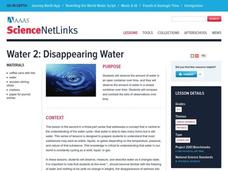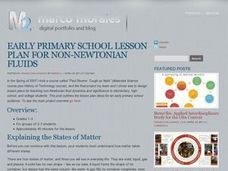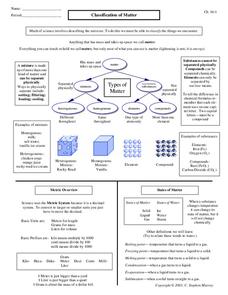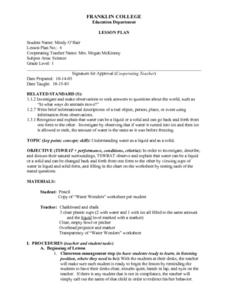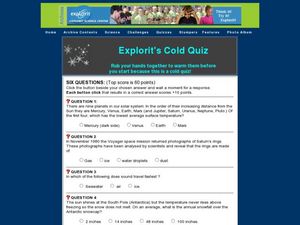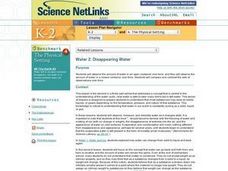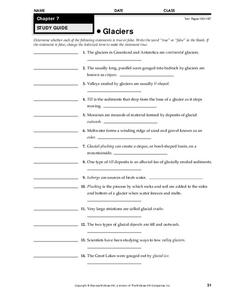Curated OER
Disappearing Water
Students explore the water cycle. In this earth science instructional activity, students observe and measure water in a closed container and in an open container. Students record their observations and compare their sets of data to draw...
Curated OER
Non-Newtonian Fluids
Students will use water, cornstarch, eggs, and more to explore the different states of matter. They will make observations of an unknown substance called "Oobleck" and test its liquid and solid properties. This would be a great lesson to...
Curated OER
Weather Dot Com
Students examine the need for a standard unit of temperature and measure temperature with a thermometer. They discuss the details of a thermometer and the calibrations used, record temperature data for inside and outside, explore...
Curated OER
Reviewing the Past Tense
In this verb tenses worksheet, students complete ten sentences using the word in parentheses in the past tense. There are no examples on the page.
Curated OER
Classification of Matter
In this matter worksheet, students compare the different types of matter, including the states of matter. Students review the metric system. This worksheet has 12 matching, 18 fill in the blank, and 4 short answer questions.
Curated OER
Email From Another Planet
In this article about emails and plants worksheet, students read short descriptions about 8 planets in the solar system and then imagine they are visiting one of the planets and send an email to a family member describing their...
Curated OER
Let's Think About Water
Students explore the different forms that water can take and conduct simple experiments to demonstrate some of its properties in each state. They watch a short video that illustrates some of these concepts.
Curated OER
Water,It's Special
Learners describe the three forms of water. Students list reasons why water is necessary. Learners access the Internet to complete Prediction lab report worksheets and FCAT-Style Questions worksheets.
Curated OER
Do Different Colors Absorb Heat Better?
Pupils work together to test how the color of a material affects how much heat it absorbs. They make predictions and take notes on their observations. They discover how engineers use this type of information.
Curated OER
Science--"Water, Water Everywhere"--Exploring Liquids
In this water worksheet, students read a 1 page article on water, fill in the blanks of 3 words with their missing letters, fill in a crossword puzzle containing 5 clues about water and answer 1 short answer question. Students draw a...
Curated OER
Ocean Currents
Young scholars determine how water and wind affect ocean currents. In this science investigation lesson, students follow the provided steps to enable them to consider how explorers may have used ocean currents to their advantage.
Curated OER
Winter Vocabulary
In this vocabulary learning exercise, students match vocabulary to definitions of words representing winter. Students complete 20 matches total.
Curated OER
Water - Solid and Liquid
First graders conduct a science inquiry by comparing water in its liquid and solid form. The students describe the different stages of water and complete a worksheet answering questions about each form of the water. Teacher assessment...
Curated OER
When You're Hot, You're Hot!
Eighth graders examine the development of the different temperature scales. They experiment with hot and cold temperatures.
Curated OER
Explorit's Cold Quiz
In this cold quiz worksheet, students complete a six question multiple choice on-line interactive quiz about cold places and cold weather.
Curated OER
Chemistry: Changing Materials
Students examine physical change with different temperature and solvents. In this elements and compounds lesson, students conduct experiments to discover what happens to the mass of a substance when is undergoes a physical change.
Curated OER
Reviewing the Past Tense
In this past tense verb review worksheet, students fill in the 10 blanks using forms of the verbs in parentheses. Students review past tense verbs.
Curated OER
Exploring Phases of Matter
Students discuss and experiment with the phases of water. In this phases of matter lesson, students recognize the different states of matter. Students measure and record changes and understand when the state changes.
Curated OER
Participial Adjectives 2 -ed/-ing
In this participial adjectives worksheet, students choose the correct way to complete the sentences with adjectives either ending in -ed or -ing. Students complete 16 sentences.
Curated OER
Survival Science: How Evaporation and Condensation Can Save Your Life!
Eighth graders demonstrate how scientific principles can be used to provide resources in an emergency situation. In this evaporation lesson students view a demonstration on a solar still and see a brief PowerPoint presentation.
Curated OER
Science: Water States
First graders investigate the various forms of water. They discuss the properties of water. They discover examples of water's various states and locate other solids, liquids, and gases in their homes.
Curated OER
Water 2: Disappearing Water
Students will observe the amount of water in an open container over time and also examine the amount of water in a closed container over time. They then will compare and contrast the sets.
Curated OER
Glaciers
In this glaciers worksheet, students review terms associated with glaciers including esker, till, plucking, and outwash. This worksheet has 14 true or false questions.
